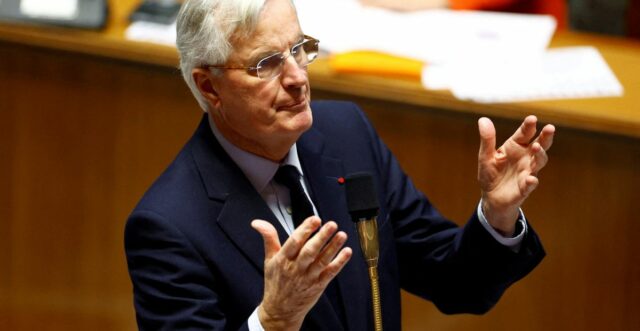
French Prime Minister Michel Barnier has made another major concession to the National Rally party, to save his fragile coalition from being toppled.
Barnier dropped planned cuts to medication reimbursements in a last-minute bid to get his 2025 budget bill over the line.
It was not immediately clear if that would be enough to save his fragile coalition from being toppled this week.
A spokesman of RN telling Reuters there were other key demands ahead of a crunch parliamentary vote at 3:00 p.m. (1400 GMT).
RN leaders were meeting ahead of the parliament’s vote on the social security part of the budget to decide its stance, he said.
It is at least the third time that Barnier has given in to RN demands after he scrapped an electricity price hike worth some three billion euros last week.
The French Prime Minister also agreed to reduce free medical help to illegal migrants.
French stocks rose on the news of his latest concession on medication.
Barnier’s struggles to get the 2025 budget through a deeply divided parliament threaten to plunge the euro zone’s second-biggest economy into its second political crisis in six months.
Ever since its constitution in September, Barnier’s minority government has relied on RN support for its survival.
The budget bill, which seeks to rein in France’s spiraling public deficit through 60 billion euros ($63 billion) in tax hikes and spending cuts, may snap that tenuous link.
On Monday afternoon, parliamentarians are due to vote on a key component of the budget, the social security financing bill.
Without the necessary votes to pass the social security bill, Barnier may invoke article 49.3 of the constitution, which would enable him to get the measure adopted without a vote.
It also triggers a no-confidence motion, however, that the RN and the left could use to topple his government as soon as Wednesday.
No French government has been forced out by such a vote since 1962.
Alternatively, Barnier could choose to roll the dice and let the vote go ahead.
If the bill is rejected, it would go back to the Senate for more alterations.
However, parties can also table a no-confidence vote even if Barnier avoids the 49.3 this time.
The budget bill has proven to be kryptonite for Barnier, who must please a fragmented parliament, while also keeping onside nervous investors with plans to cut the deficit to five per cent of economic output in 2025 from over six per cent this year.
A move to bring down the government would not be without risks for the RN, which has moved from the fringes to the mainstream in recent years and is eager to show it is a government in waiting.
Gabriel Attal, Barnier’s predecessor as prime minister and now head of Macron’s lawmakers in the National Assembly, urged the RN and the left to back-away from the no-confidence motion.
“Instability is a slow poison, which will gradually attack our economic attractiveness, our financial credibility, and the confidence, already undermined, that the French have in their institutions,” he wrote on X.
(With inputs from Reuters)
Delhi based journalist pickled in journalism. Have reported from nine world capitals and almost all parts of India. Over the last three decades, I have worked for India’s mainstream English dailies and contributed to All India Radio, Doordarshan and Women’s Feature Service. Also worked for international media including Japan’s leading newspaper, The Asahi Shimbun and done assignments for The Sunday Times, London, The Telegraph, The Guardian and the Canadian Broadcasting Corporation. Worked in the Embassy of France in New Delhi and can speak French to save my life. Write on Diplomacy, Politics and the social sector. Love Nature, heritage, Nature, animals and vintage cars. Enjoy cycling and playing badminton.




